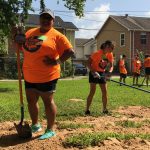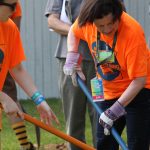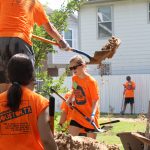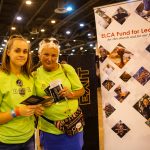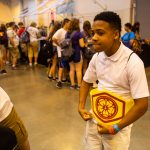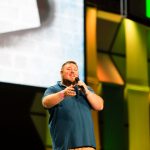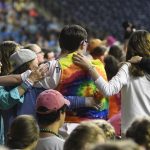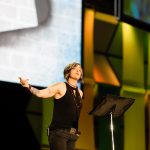“God’s grace changes everything” set the tone for the second full day of the ELCA Youth Gathering. Youth and adult leaders dispersed to Synod Day, Interactive Learning, Community Life and Service Learning sites around Houston.
Seminarian Kelsey Brown, vicar at St. Paul Lutheran Church in Santa Monica, Calif., was extremely moved to serve with her youth at Freedmen’s Town for Service Learning. Brown believes the Holy Spirit worked through the founders of Freedmen’s Town, in the lives of freed people making a difference. She felt the presence of the Spirit today, as the people of the neighborhood still occupy this rich history, and that such a difference will continue to live on.
Logan, a youth participant from Incarnation Lutheran Church in San Diego, felt the significant history of this Service Learning location. “The history of this place is beautiful, empowering, and strong. This was built from being enslaved and being treated in a way no human ever should be. They went from being in slave houses to being able to build their own city.” Jon, from Lutheran Incarnation Church of Poway, CA was inspired that ELCA Presiding Bishop Elizabeth Eaton participated in Service Learning at Freedmen’s Town. He said, “It was pretty great to see the head of the Lutheran church out here with the youth groups.”
In the Interactive Learning at NRG Center, Katie Hrybyk from St. John’s Lutheran Church, MD, visited the Women of the ELCA exhibit on human trafficking. She was surprised to learn how many people become victims of human trafficking but was glad to discover her church is working to end it. “The more people that know about (human trafficking) and are aware of it, the more we can do about it,”Hrybyk said.
In the “God adores you!” space sponsored by Reconciling Works, Aiden, 17, and Z. (name changed for privacy) were writing cards of encouragement for people in the LGBTQIA+ community. “I learned (here) that I can be more comfortable about my sexuality around other faith and other Lutherans and… it really hits me in the heart,” Aiden said. “It’s really difficult hiding who I am.”
Z. has also hidden her sexuality from her parents. “I now know it’s okay to be who you are; God still loves you,” she said.When asked if she’s had any uplifting moments at the Gathering, Z. remarked, “Literally right now—I actually got one of these (God adores you!) cards. One of them actually said, ‘Add me on Snapchat’ and they added me and said, ‘I would love to meet you.’”
At the “People on the move: A migrant and refugee experience” exhibit, sponsored by Lutheran Immigration and Refugee Services, Lutheran Disaster Response, and the ELCA’s AMMPARO initiative, participants walked through a simulation reflecting the journeys of people who are migrants and refugees.
Marta Vuola from Christ the King Lutheran, Snohomish, WA, followed the long, dangerous, and traumatic path of the Rohingya, an ethnic group fleeing persecution in Myanmar. Vuola was shocked by the experience. “I am so privileged, why do other people go through this? … It’s hard to think of it,” she said. “(This) gave me more empathy for others.”
ELCA missionary Chandran Martin spoke with groups about the ways Lutheran Disaster Response is supporting refugees in Bangladesh and worldwide. Upon learning this, Masame Fletcher, also from Christ the King, said, “It’s really amazing, we’re contributing to a big thing, and I feel proud to be part of it.”
Youth also enjoyed interacting with the ELCA World Hunger Global Farm Challenge, checking out ELCA colleges and universities, playing sports and more.
Grace was the primary focus of Mass Gathering.
Elizabeth Peter opened the evening by examining the Biblical story of the Ethiopian Eunuch, who was stigmatized and stereotyped. “Maybe you’ve been stereotyped, too,” she said, later adding: “There are times where I feel like I’m not always included. I don’t always feel welcomed in the church. Because of my skin, my gender, my youth, my hair, the way I talk and dress.”
She asked the over 30,000 participants in NRG Stadium if they knew how they judged and excluded others in the church and in the world. Peter reminded everyone they are a vehicle for God’s grace, and grace can show up not just in unexpected places, but also unexpected people. She wanted everyone present to know and remember after tonight, “You are indeed in the limitlessness of God’s grace.”
God’s limitless grace was reflected again and again as others took the stage to share their stories, including Michaela Shelley, who has been fighting mitochondria disease since she was a teenager. For a long time, she was angry at God and at everyone.
Then she started connecting with other teenagers with mitochondria disease, eventually creating an online support group for teens like her that has now connected 500 people from 20 countries. “No matter how many times you curse God, he still loves you no matter what,” Shelley said. “God’s grace is not only about forgiveness but about the way you can become the person you are meant to become.”
From her powerful testimony on God’s grace, Michaela Shelley wanted people to remember that even in the midst of her honest words on life and death, that children living in similar situations could still be a normal kid.
Singer Tauren Wells brought the crowd to their feet with upbeat, thoughtful songs expressing God’s deep love for us. “It’s hard truth and ridiculous grace to be known fully known and loved by you,” he sang. “I’m fully known and loved by you.”
Will Starkweather, an ELCA pastor, shared his experience with cutting during his teenage and young adult years. In college, when he revealed his secret to his pastor, that pastor told Starkweather he was going to hell. Starkweather left the church, dropped out of school and fell into a deep depression—and he cut.
Eventually he began to rebuild his life. He found a new church, then divulged his secret to the pastor. “Pastor Carla listened and then she also said four words: There’s grace for that,” Starkweather said. “Y’all, those words changed my life.”
He learned cutting is a coping mechanism for stress and began to start sharing his story with others so they’d know they were not alone. Starkweather went on to become an ELCA pastor. Acknowledging the hurt and pain that resides in each of us, Starkweather told all who were gathered, “We are all recovering from something—and there is grace for that.”
After concluding a powerful testimony to a standing ovation, Starkweather greeted friends behind the stage. From his talk, he wanted people to take home with them that there is “no such thing as ‘too broken.’ Our broken places are where God brings out beauty.”
“One of my best friends at school is cutting,” said Julia Novak, 15, Evangelical Lutheran Church, Evangelical Lutheran Church, Fredrick, Md. “When one of your friends is cutting it impacts all of your friends.” Seeing Starkweather talk helped her see “people aren’t alone in what they’re doing and you can always get through it.”
Cassie Cole, 17, from a church in Florida, agreed: “We have a member in our group who used to self-harm. … I think (the speech) was really powerful to her.”
Nadia Bolz-Weber, an ELCA pastor and best-selling author, gave the final talk of the evening. She told youth that when she was a teen, she struggled with an autoimmune disease that made her eyes bulge out. “My daily reality at your age was name calling and social isolation,” she said. “If I was a kid at the Gathering (today), I would be the kid who refused to stand up when everyone else stands up.”
Bolz-Weber said it was difficult to write in her book about the pain and alienation of her youth, which led her to substance abuse. She proclaimed to youth: “If your life totally sucks right now, if you struggle with having friends or feeling like and outsider, just know that your current reality is not your ultimate reality.
“There’s a word for when our tears turn to joy. There’s a word for when our pain is a home for those who also hurt,” Bolz-Weber said. “And that, my Lutheran friends, is grace.” She said she wishes someone had told her 15-year-old self what grace was. That’s why Bolz-Weber writes and preaches so honestly about her life experiences, because “the jagged edges of our humanity are what connect us to God and to each other.”
God isn’t waiting for you to be thinner, smarter or more spiritual, she preached. “You are magnificently imperfect. The self God loves is your actual self, not your ideal self. And there’s a word for this: grace.”
The implications of God’s radical grace mean that God’s grace is also for our enemies, she said. The uncomfortable truth is this: “salvation of my enemy is also wrapped up in my own salvation,” Bolz-Weber said.
In closing out her speech, Bolz-Weber called on all who were gathered to renounce the devil in his many manifestations—in our racism, sexism, classism, ableism, heterosexism and other forms of hatefulness.
She asked: “Do you renounce the lies that tell you grace isn’t real, that there’s anything grace can’t redeem?”
The crowd responded, “I renounce them.”
“Well, me too,” she said. “Amen.”
Jamie Jimenz, 18, Augusta, GA, loved how honest Bolz-Weber was about her past and her flaws. She related to Bolz-Weber’s experiences with bullying, and will remember “how (hardships) make you feel now is not the way you’re going to feel for the rest of your life.”
“I liked Nadia and how she used her story to show that god shows his grace to everyone and doesn’t discriminate,” said Olivia Sullivan, also from Evangelical Lutheran, MD.
For Sullivan, the most powerful moments of the night were when she and youth around her were singing and swaying together to music. Following Bolz-Weber’s speech, youth with “Loved” shirts flooded the stage and floor as the House Band performed its final song.
“Words can’t really explain it, but there was this power and you could really feel God’s love in the arena,” Sullivan said.

